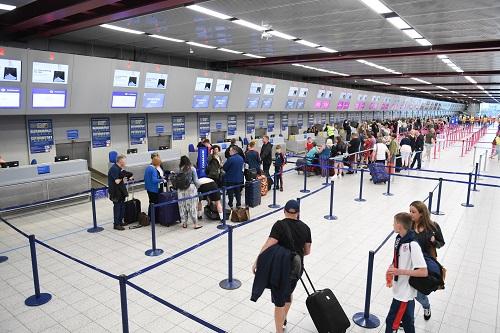Fourteen-day quarantine measures imposed on incoming travellers returning to England in summer 2020 helped prevent the spread of the SARS-CoV-2 virus, particularly among 16-20 year olds, according to new research from the University of Cambridge, the Wellcome Sanger Institute, COVID-19 Genomics UK (COG-UK) consortium and UKHSA.
The study, published in Nature Communications, examined the effectiveness of this policy by analysing contact-tracing data from NHS Test and Trace and genome sequences made available through COG-UK.
In July 2020, following the first months of the pandemic, the UK government established new rules for travellers to and from England, in order to reduce the number of COVID-19 cases being imported into the country. Between 4 July 2020 and 1 February 2021, it established ‘travel corridors’ to countries deemed to be low risk for COVID-19, meaning that travellers returning from these countries did not need to quarantine. However, the majority of people returning from countries outside these corridors were required to quarantine for 14 days at home.
The team compared the number of contacts reported per case prior to a COVID-19 diagnosis between individuals returning from a country with a requirement to quarantine and those who did not need to quarantine on return. They tracked the spread of genomes from imported cases.
The researchers identified 4,207 positive COVID-19 cases in England between 27 May 2020 and 13 September 2020 related to international travel – with more than half (51%) of all imported cases coming from just one of three countries, Greece, Croatia, and Spain.
Travellers with COVID-19 returning from countries that required them to quarantine had fewer contacts than those returning from countries within the travel corridors, and so were less likely to pass on the infection to others. Using mathematical modelling, they estimate that individuals travelling from a country requiring quarantine had an average (mean) of 3.5 contacts, 40% fewer than someone returning from a country that did not require quarantine measures (who had an average of 5.9 contacts).
The number of contacts per case was greatest in the 16-20 age group who had travelled to countries with no requirement for quarantine, with a mean of 9.0. When quarantine was required, this fell to 4.7, similar to that of other age groups.
Genomic sequencing allowed a number of unique imported SARS-CoV-2 genomes to be identified that could be monitored to see how widely they had spread. The cluster size – that is, the number of related cases of onward transmission – for genomes imported from a country without a requirement to quarantine on return was significantly higher than for those related to countries with mandatory quarantine in place.
Dr Dinesh Aggarwal, Department of Medicine, University of Cambridge said “Although the pandemic now looks very different to how it was in 2020 – with the emergence of new variants offset by increased vaccination – there are still important lessons that can be learned about the effectiveness of quarantine, in particular for future pandemic preparedness. Our study shows that while travel restrictions are effective in reducing the number of imported COVID-19 cases, they do not eliminate them entirely. It’s likely that one of the main reasons that quarantine measures helped is that they put people off travelling during this period.”
For the most common destinations – barring Spain – the number of imported cases dropped when the government removed a country from the ‘safe’ list and reintroduced mandatory quarantine.
The majority of importations from Greece came at the end of August and continued into September, a period during which there was no requirement to quarantine for travellers returning from the county – this was the source of greatest imported SARS-CoV-2 cases during the study period.
Dr Ewan Harrison, Wellcome Sanger Institute said “Genomics has proven to be an invaluable tool in monitoring how the coronavirus spreads and helping inform infection control measures. By applying it to travel-related cases, it could help governments rapidly refine their travel policies and consider if any quarantine measures are appropriate.”
